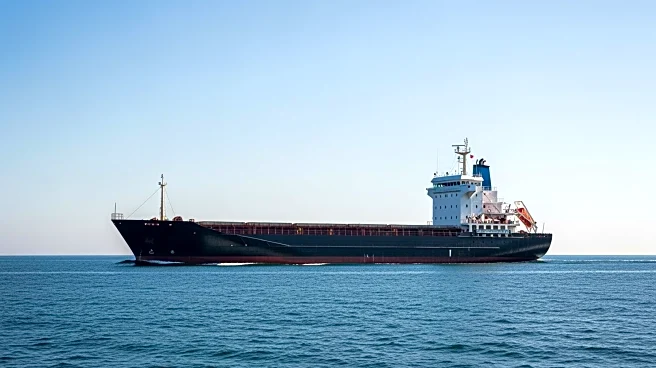What's Happening?
Matson, a leading U.S. ocean container carrier, is set to save up to $80 million annually following the U.S. and China’s decision to postpone reciprocal port fee programs. Despite this financial relief,
Matson is experiencing significant declines in ocean revenues and income due to ongoing global trade uncertainties. The company reported a muted peak season on its transpacific trade lane, with lower freight rates and reduced container volumes from China to the U.S. Matson's third-quarter operating income fell by half, and a 30 percent year-over-year decline is anticipated for the fourth quarter. Container volume for its China service dropped by 12.8 percent in the third quarter, with no expected improvements in the current quarter.
Why It's Important?
The postponement of port fees between the U.S. and China is a significant development for Matson, providing substantial cost savings amid challenging market conditions. This move reflects broader efforts to stabilize global trade relations, which have been strained by tariffs and geopolitical tensions. The reduction in fees could lead to a more predictable trading environment, benefiting companies reliant on transpacific shipping routes. However, Matson's financial struggles highlight the ongoing volatility in global trade, affecting revenue and operational strategies. The cautious approach by customers regarding inventory levels further underscores the uncertainty in the market.
What's Next?
Matson is awaiting specific instructions from the U.S. and China regarding the postponed port fees, including potential rebates for fees already paid. The company is assessing its fleet schedule and vessel charters to optimize operations in light of the fee suspension. The broader impact on global trade relations remains to be seen, as stakeholders monitor the implementation of these agreements. The U.S. and China’s decision to suspend port fees could pave the way for more comprehensive trade agreements, potentially easing tensions and fostering a more stable economic environment.
Beyond the Headlines
The postponement of port fees may have deeper implications for international maritime policies and trade negotiations. It highlights the interconnectedness of global supply chains and the need for cooperative strategies to address trade barriers. The decision could influence future diplomatic engagements between the U.S. and China, setting a precedent for resolving trade disputes through negotiation rather than unilateral actions. Additionally, the financial relief for companies like Matson may encourage further investment in infrastructure and technology to enhance operational efficiency and resilience.









